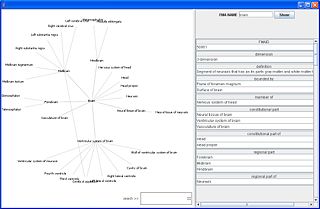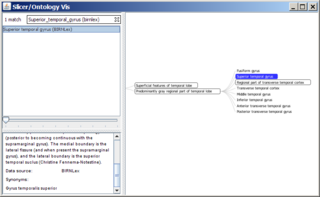FMA (Protege) links to Slicer
Key Investigators
- GE: Viswanath Avasarala, Jim Miller
- Harvard: Ion-Florin Talos
- Stanford: Michael Hall.
Objective
We are building algorithms to browse protege's frame based ontologies. This capability will allow us to integrate some very extensive anatomy ontologies like the Foundational Model of Anatomy into slicer3. Also, we plan to develop reasoning algorithms to work with physiological ontologies of brain based on Protege's frame based representation.
Approach, Plan
Based on the idea's presented in the paper, "OQAFMA Querying Agent for the Foundational Model of Anatomy", we will build a query-engine that allows a software program to navigate through protege ontologies. We will use this capability to develop a ontology browser for FMA.
<foo>.
Our plan for the project week is to first try out <bar>,...
Progress
1. Integration of FMA browser with Atlas. 2. Integration of Query engine to Ion-Florin et al's physiological ontology of brain.
References
- Talos I, Rubin D, Halle M, Musen M, Kikinis R. A prototype symbolic model of canonical functional neuroanatomy of the motor system. J Biomed Inform. 2008 Apr;41(2):251-263.
- C. Rosse and J.L.V. Mejino, A reference ontology for biomedical informatics: the Foundational Model of Anatomy. J. Biomed Inform. 36:478-500, 2003.
- P. Mork, J.F. Brinkley, and C. Rosse, OQAFMA querying agent for the Foundational Model of Anatomy: providing flexible and efficient access to a large semantic network. J. Biomed Inform. 36:501-517, 2003.
- Talos I, Rubin D, Halle M, Musen M, Kikinis R. A prototype symbolic model of canonical functional neuroanatomy of the motor system. J Biomed Inform. 2008 Apr;41(2):251-263.

